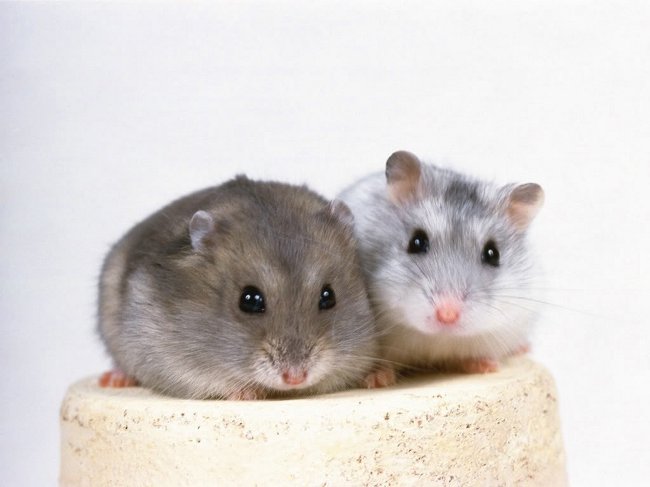Diseases of hamsters
 Unfortunately, no animal is immune from various diseases. Hamsters are no exception. If you live a hamster, you should know what kind of diseases of hamsters, because the sooner you notice that your pet is sick, the more chances you have to cure it.
Unfortunately, no animal is immune from various diseases. Hamsters are no exception. If you live a hamster, you should know what kind of diseases of hamsters, because the sooner you notice that your pet is sick, the more chances you have to cure it.Have healthy hamster should be shiny and well-groomed hair,calm and regular breathing, clean and bright eyes. A healthy hamster is very mobile and curious, but always on the alert. He has a good appetite and stores food for future use. If one or several of these signs are absent at one time, chances are that your hamster is sick.
What are the main signs of hamster disease? It is necessary to carry a hamster to the veterinarian, if:
he refuses food and water
he became slow and sluggish, stopped playing
His hair was faded, he became disheveled and untidy,
his eyes are constantly closed
he is losing too much weight or vice versa - he is getting better
In addition, often hamster diseases have the following symptoms:
itching (the hamster is constantly itching)
loss of hair, bald spots
dry skin, scabs, dandruff
a sharp unpleasant odor
discharge from the nose, eyes, ears, genitals
opaque lens
an increase in the eyeball (the eye seems to be "protruded")
Wounds, ulcers, crusts on the body
copious salivation
limp
diarrhea
heavy breathing, shortness of breath, sneezing
If you have at least one of these symptoms, you need to contact the veterinarian - do not think that everything will go away by itself. Only a veterinarian will be able to diagnose correctly and prescribe a treatment. Many medicines intended for humans orother animals, will not help the hamster, but on the contrary, they can kill him. Therefore, it is very important to use for treatment only those drugs that the veterinarian prescribed, and accurately observe the dosage.
What are the most common diseases of hamsters? Many of them (although not all, of course) are the result of improper care. For example, if you feed yourhamster (give him too little water, too much dry food, too much fatty food, etc.), he can get sick. Most often because of improper ration in hamsters, diarrhea, constipation, dehydration, exhaustion or obesity begin. In this case, it is very important to bring your pet's diet back to normal.
Sometimes a wet abdomen in a hamster is a sign of not diarrhea, but another serious disease of hamsters called Wet tail. It is an infectious disease that, apart fromdiarrhea is accompanied by dehydration, loss of appetite, rectal bleeding, irritability and ruffled hair. Treat the "wet tail" with antibiotics, which are prescribed by the veterinarian. In addition, you need to disinfect the hamster cage or buy a new one.
Her one common disease of hamsters is chickenpuff inflammation. Most cheek pouches are inflamed if the hamster tries to put something sharp on the cheek and as a result scratches it from the inside, or if a product gets stuck in the cheek (for example, a seed). Do not remove the jammed food yourself: Hamsters are very fragile, and you can only make it worse. But a veterinarian will probably be able to help your hamster.
Some diseases of hamsters are accompanied by sneeze. If your hamster sneezes - he has either pneumonia or an allergy. Allergy can be for food, sawdust, etc. To get rid of it, it is enough to find and exclude the allergen from the hamster's environment. A pneumonia comes from hypothermia - hamsters are quite sensitive to temperature changes. It is treated with antibiotics. Preparations and their dosage for pneumonia should be prescribed by a veterinarian.
If your hamster started to lose one's hair, then he either has baldness, or deprive. These two diseases are quite easy to confuse, although there is a way to distinguish them. In a large deprive hamster skin in scales and wound, and with baldness it is smooth and clean. Usually the reason baldness - beriberi, so it is treated with vitamins. Sometimes a hamster is balding with stress, so it is important to ensure rest for treatment. A lichen is treated with special ointments.
We listed only the most common diseases of hamsters. In addition, hamsters have infectious diseases of the bladder and kidneys, fractures of the paws or tail, colds, bronchitis, tumors, dental problems and other diseases.
Proper content and diet will help to protect your hamster from many diseases, but Even with perfect care your hamster can not be immune from diseases. Remember that diagnosing and treating illnesseshamsters can only be a veterinarian, so the sooner you notice the symptoms and consult a specialist, the more chances your pet will safely recover.














